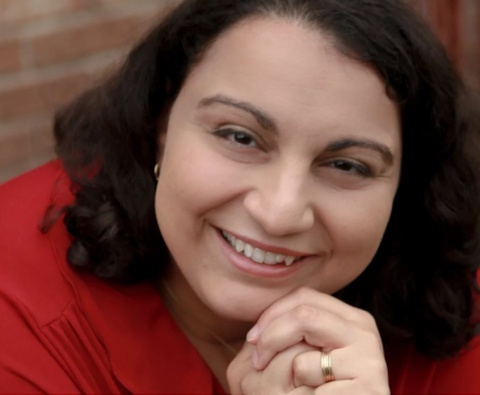Columbia College | Columbia University in the City of New York
Take Five with Phoebe Farag Mikhail ’00

What were you like when you arrived at Columbia?
I remember being serious, earnest and studious. I didn’t expect to be homesick, but I was. It took me a little time to relax and feel like I belonged on campus. I thankfully made a few friends right away and got involved in campus life outside of classes. Early on, I participated in the Harlem Tutoring Project; Pastor Luther Kriefall signed us up during Orientation, and once a week I joined a number of other Columbia students in the “tutoring van” for the drive up to his church at West 145th Street, where there was an after-school tutoring program for elementary school children. Some of the tutors weren’t students, but nearby Upper West Side residents. One was a vibrant woman named Xiomara who fostered stray animals and herself grew up in foster care. She intrigued me so much I wrote about her in my journal, which I recently found in some boxes in my parents’ garage! After being surrounded by first-year students wanting to impress each other, Xiomara’s effortless humility drew me in. Once I saw her copying a page out of one of the children’s mathematics textbooks about percentages. “I never learned this,” she said, “and they explain it really well.” Right then I recognized how much I could learn outside of class.
What do you remember about your first-year living situation?
I lived in Carman with a roommate I hadn’t met before. We got along for the most part, but had little in common. It was a small room and so I mostly spent my time outside of it, which was a blessing in disguise. I got to know all the campus libraries well, found my favorite study table at Butler, and generally remained out and about, making friends and getting involved in campus activities.
What Core class or experience do you most remember, and why?
One strong memory I have is from CC. A particular student who had started off the year a vocal egoist ended the year recognizing that a selfish life is meaningless. I don’t remember his name, but I remember occasional conversations with him after class, and the professor noting his change in perspective by spring. I also remember discovering, through Music Hum, how entertaining opera could be. The Core Curriculum drew me to the College, and every day I recognize how important it was to have that in common with my classmates and friends. I wish every university offered it. Our public conversations might be so different if we could all start with a common language.
Did you have a favorite spot on campus, and what did you like about it?
I loved walking into St. Paul’s Chapel when it was empty, or when someone might be alone in there but playing some music. I enjoyed the quiet respite when I felt overwhelmed.
What, if anything, about your College experience would you do over?
So much of my College experience has shaped who I am today that I’m pretty sure I’d do most of it again. Every day held discovery. Once, walking through Earl Hall after finishing something, either for the Orthodox Christian Fellowship or for the Interfaith Library, I saw a nun in an office and stopped by to meet her. I had seen her on campus and wondered who she was. Sister Leslie turned out to be the Episcopalian chaplain, and we built a lovely relationship. Eventually, she learned about my love of writing and that Madeleine L’Engle was one of my favorite authors. Later that semester, Sister Leslie told me that L’Engle herself was offering a writing class at the nearby convent, and would I like to join? Did I ever! I would take that class over in a heartbeat.

